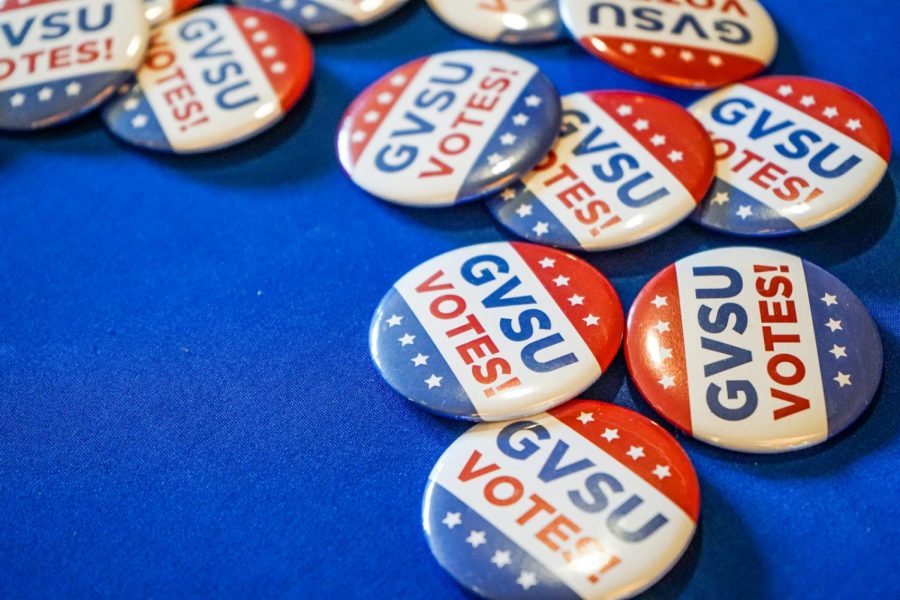Nov. ballot proposals could impact elections and transparency
Sep 26, 2022
As midterm elections approach, Michigan voters, including those at Grand Valley State University, have been asked to consider a number of ballot initiatives aimed at reforming state systems and policies.
While much attention has been focused on the Right to Reproductive Freedom Initiative, or Proposal 3, additional proposals including Voters for Transparency and Term Limits (Proposal 1) and Promote the Vote 2022 (Proposal 2) could have wide-ranging effects should they secure passage.
Proposal 1 seeks to remove the mystery surrounding how our elected officials make their money. Michigan is one of only two states in the country which does not require its elected officials to disclose their finances or conflicts of interest. Proponents of Proposal 1 seek to shed some transparency on the motives and influences of state officials.
Proposal 2 seeks to protect the power of Michigan votes. It aims to enhance the fairness and integrity of elections by making a few changes to the voting system.
According to Proposal 2’s website, passage of the measure would usher in sweeping changes to the state’s election systems that would include both provisions for voters’ rights at the polls as well as requirements surrounding candidates’ financial disclosures and how voting is conducted by the state.
As far as these two proposals go, the general sentiment among some GVSU students is that they would be welcome additions.
“I will be voting for Proposals 1 and 2 this November,” said GVSU junior Drew Jones. “Financial transparency is essential in today’s political world and greater ease of voting is a net benefit to democracy.”
Jones also pointed out what he saw as the benefits of requiring term limits for elected officials.
“Term limits prevent incumbents from being continuously re-elected and encourage new ideas and new people to enter office,” Jones said. “Stagnant seats like we have seen in the U.S. Senate do not benefit anyone.”
Another student in support of term limits for elected officials was GVSU sophomore Eden Hodgson.
“All state-elected officials should have term limits,” Hodgson said. “I’m a big believer in ‘power corrupts and absolute power corrupts absolutely.’”
Hodgson also said that while she values the privacy of others, public officials do have a duty to the people they represent to disclose financial information in an effort to keep their motivations transparent.
“While privacy is a fundamental human right, I think financial transparency in elected officials could protect a greater amount of peoples’ rights, and I value that,” Hodgson said.
Nikolas Tompkins, a GVSU junior, echoed similar sentiments.
“Increasing transparency within the political ecosystem will increase confidence within our candidates and can help to weed out political figures who don’t have the people’s best interest in mind,” Tompkins said.
Tompkins was also in support of requiring term limits in relation to Proposal 1.
“Term limits allow for new candidates to get into congress and don’t allow for the same candidate to influence policy for decades,” Tompkins said. “As a result, younger candidates, with a more modern and younger political insight can create and vote on policy that affects them more.”
In terms of making voting more accessible for concerned citizens, Tompkins said opinions in different communities can complicate the voting process.
“It isn’t necessarily hard to vote in this state,” Tompkins said. “But, in more rural areas, where the privacy of your vote isn’t as guaranteed, voting against the favored candidate in the area can make the voting experience very uncomfortable and can cause public backlash.”
Tompkins also mentioned that upgrading the cyber networks used for voting could go a long way in furthering that same idea.
“If the state could make their websites more secure, then online voting could increase access and comfortability to voters in general,” Tompkins said.
While the proposals have been positively received by many, some still see room for improvement in state systems.
In terms of making voting easier for the constituents of Michigan, Jones also recommended some changes that might go a long way towards furthering that goal.
“Automatic registration for adults would prevent confusion among less-engaged citizens,” Jones said. “Also, proactive advertising of mail-in ballots and other forms of early voting would help people who consider themselves too busy to vote to participate more easily.”
To view the language of Proposals 1 and 2 and to find a complete list of candidates and proposals on each precinct’s ballot, visit the Michigan Voter Information Center.
























